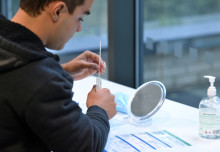
Drs Tim Knowles, Greg Scott and Ed Presswood make their pitch to the judges. Photo: Layton Thompson

The winners of a competition for academic and NHS staff will receive help to develop their ideas for smartphone apps to improve healthcare.
Clinicians and researchers from Imperial were invited to submit a 250-word design brief for an app that would transform how health services are delivered and how medical staff communicate with patients.
Two entries, an app that helps patients strengthen their lungs before undergoing surgery and another to help doctors share clinical images, were chosen as joint winners by the judges.
The competition was organised in partnership between Imperial College Healthcare NHS Trust, Imperial College London and DigitalStitch, a spin-out company from Imperial College London specialising in developing mobile technologies for healthcare.
Working in a healthcare environment, many members of staff have fantastic ideas on how we can use smartphones and applications to improve patient care and efficiency.
– Professor Lord Ara Darzi
Director, Institute of Global Health Innovation
Twelve contenders selected from over 60 entries pitched their ideas to a panel of experts in a Dragons’ Den-style contest. The apps had to be financially viable, unique and innovative. Submissions covered a wide range of services, including patient information, diagnostic aids, surgical devices and data capture.
One winning app, designed by surgeon and Clinical Research Fellow Mr Muzzafer Chaudery, aims to strengthen patients’ lungs pre-and post-surgery. The idea came to Mr Chaudery while working in the US, where he noticed that many patients having major abdominal and cardiothoracic surgery had a spirometer device, which tests lung function, next to their bed.
“I wanted to create a lightweight, portable equivalent that patients could use in the weeks running up to surgery to strengthen their lungs and reduce the incidents of complications like chest infections,” he said.
His innovation will be piloted in a study with patients at Imperial College Healthcare.
The second winning app came from a trio of inventors: Dr Tim Knowles, an A&E Senior House Officer; Dr Greg Scott, an academic neurology registrar; and Dr Ed Presswood, an academic clinical fellow. They created an app to help health professionals share clinical images.
When a doctor seeks advice from a colleague about a condition or injury, they have to describe it over the phone or request a medical photographer – a service which takes time and isn’t available out of hours. The app would allow clinicians to securely share images, with the patient’s consent, and store images for use in teaching or research.
“The app will allow us to take high quality images that are beneficial to our clinical colleagues in planning a patient’s treatment,” said Dr Knowles. “For example, if a patient came into A&E with a motorcycle injury like a fractured ankle, which needed immediate orthopaedic surgery, we could photograph the injury before the surgery and send the images to the plastic surgery team for review so they could begin planning how they would treat the patient’s skin loss and soft tissue damage.”
The judging panel included Professor Lord Ara Darzi, Director of the Institute of Global Health Innovation at Imperial College London; Kevin Jarrold, chief information officer at the Trust; and Tim Kelsey, director for patients and information at NHS England.
Peter Hames, CEO of Sleepio, an app which uses cognitive behavioural therapy to help people with anxiety and insomnia to sleep, was also on the panel providing industry experience. Tim Bunting, a partner in the venture capitalist firm Balderton Capital, examined the ideas from a funding perspective.
Professor Darzi said: “Working in a healthcare environment, many members of staff have fantastic ideas on how we can use smartphones and applications to improve patient care and efficiency.
“I have often been approached by staff wanting to share their ideas and this competition is the first of many we hope to run to give staff a formal vehicle to bring their innovations forward.”
The creator of the winning applications will receive support and expertise worth £15,000 to design, develop and market their innovation. DigitalStitch will help the winner to bring their idea to market.
The app competition is the first in a line of projects from the Helix Centre for Design in Healthcare, a collaboration between the Royal College of Art, Imperial College London and Imperial College Healthcare. Helix will bring together designers and NHS staff to develop technological solutions to everyday problems on the ward and beyond.
Article text (excluding photos or graphics) available under an Attribution-NonCommercial-ShareAlike Creative Commons license.
Photos and graphics subject to third party copyright used with permission or © Imperial College London.
Reporter
Sam Wong
School of Professional Development

Contact details
Email: press.office@imperial.ac.uk
Show all stories by this author




Leave a comment
Your comment may be published, displaying your name as you provide it, unless you request otherwise. Your contact details will never be published.